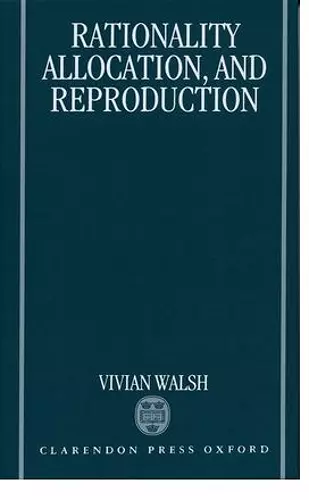Rationality, Allocation, and Reproduction
Exploring the Foundations of Economic Rationality and Policy
Format:Hardback
Publisher:Oxford University Press
Published:25th Jul '96
Currently unavailable, and unfortunately no date known when it will be back

This book offers a critical analysis of rationality in economics, exploring its implications for welfare, allocation, and policy-making, as seen in Rationality, Allocation, and Reproduction.
This monograph critically examines the foundations of microeconomic theory, focusing on rationality, welfare, resource allocation, and capital reproduction. The work delves into the various interpretations of rationality crafted by 20th-century economists, highlighting the complexities that arise when applying the term 'rational' in formal economic contexts. Unlike the strict definitions often employed in economic theory, everyday understandings of rationality are far more nuanced and laden with moral implications. The book posits that discussions surrounding rationality are never devoid of values, as they often involve debates about the legitimacy of goals and the existence of obligations.
Rationality, Allocation, and Reproduction challenges the limitations of the formal definitions of rationality that have been widely adopted in economic theorizing. It presents a critical analysis of how the concept has permeated not only economics but also social sciences and policy-making, influencing decisions that impact society and the environment. The author begins by addressing the neoclassical economic assertion that a rational agent maximizes utility, before exploring the evolution of this notion to a more austere definition based on consistency of choices.
In the latter chapters, Vivian Walsh investigates the philosophical consequences of replacing everyday rationality with formal constructs designed for general equilibrium, decision, and game theory. He argues for the necessity of reexamining these concepts in light of a shifting intellectual climate that has moved away from strict formalism. The final chapters provide a contrast by presenting a more accessible account of the diminished role of rational choice in contemporary economic thought, drawing from the insights of classical economists from the 18th and 19th centuries.
Thought-provoking volume * ASLIB Book Guide, vol. 62, no. 2, February 1997 *
It provides a retrospective and integrated account of his career-long interest in the idea of rationality and its evolution and use in both neo-classical and classical economics ... The fact that the book may be viewed as a success ... is testimony to both Walsh's clarity of vision and to his skill in presenting a relatively detailed and complex web of argument in a style that should prove approachable and engaging to both economists and philosophers ... it is no criticism to suggest that this book will leave many readers wanting more. * Economic Journal *
This is a book bristling with references in which Walsh traces the history of neo-classical welfare economic theory, presents a variety of criticisms of it, and contrasts it with the classical framework. * Economics and Philosophy *
ISBN: 9780198287728
Dimensions: 225mm x 144mm x 22mm
Weight: 499g
314 pages